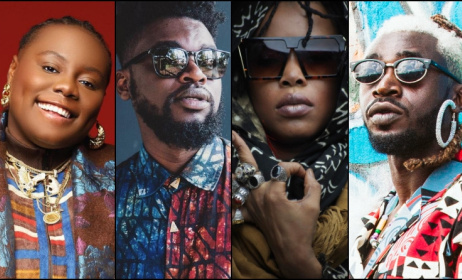Zanzibar: Despite uncertainties, Sauti za Busara pulls off another successful fest
By Paul Owere
The 19th edition of Sauti za Busara music festival reached a climax on Sunday night at the Old Fort in Stone Town, Zanzibar, where an exciting array of artists thrilled revellers.
 Prof Mohamed Ilyas and his taarab ensemble Nadi Ikhwan Safaa. Photo: Sauti za Busara
Prof Mohamed Ilyas and his taarab ensemble Nadi Ikhwan Safaa. Photo: Sauti za Busara Msaki. Photo: Marc Ngotonie
Msaki. Photo: Marc Ngotonie Fanie Fayar. Photo: Sauti za Busara
Fanie Fayar. Photo: Sauti za Busara Upendo Manase. Photo: Sauti za Busara
Upendo Manase. Photo: Sauti za Busara Wamwiduka Band. Photo: Marc Ngotonie
Wamwiduka Band. Photo: Marc Ngotonie Sholo Mwamba. Photo: Marc Ngotonie
Sholo Mwamba. Photo: Marc Ngotonie
This year’s festival was held under the theme, Paza Sauti: Amplifying Women’s Voices. In his opening remarks, festival director Yusuf Mahmoud noted that in the hands of the right people, microphones are “our weapon to fight injustice, to build peace and unity across borders.”
Sauti za Busara, which is traditionally held in February, brought the usually calm and quiet Stone Town to life as thousands filled the iconic Old Fort. Over three nights, some 20 acts thrilled music lovers who had travelled from around the world to catch a glimpse of Africa’s musical diversity and talent.
For many of the performers and fans in attendance, this was their first outing in almost two years after the onset of the global pandemic, which had brought international travel and economies to a standstill.
The artists were mainly drawn from the Eastern and Southern Africa regions, given the stifling travel restrictions that certain parts of the world still face due to the pandemic.
The rich line-up of artists featured Tanzania’s Siti & The Band, Sholo Mwamba, Vitali Maembe, Ben Pol, Zan Ubuntu, Wamwiduka Band, Nadi Ikhwan Safaa, Upendo Manase, Bahati Female Band and surprise act G-Nako.
Artists from the rest of Africa were Suzan Kerunen (Uganda), Sampa the Great (Zambia/Australia), Msaki (South Africa), Sjava (South Africa), Nomfusi (South Africa), Evans ‘Pfumela’ Mapfumo (Zimbabwe), Sylent Nqo (Zimbabwe), Fanie Fayar (Congo-Brazzaville), Aleksand Saya (Reunion) and iamsiwas (South Africa/Australia).
Speaking after her performance on Sunday, Msaki said Sauti za Busara was not only advocating for gender parity in the music industry but also taking positive action behind the scene to ensure that women are included in the technical aspects of organising and staging a festival. The popular South African singer performed two sets at Sauti za Busara 2022 – one with a full band on Saturday and another with a DJ on Sunday, showing the audience her wide scope of musical influences and output.
“I enjoyed the two nights that I performed here,” Msaki said. “It was thrilling to be out here with appreciative audiences after two difficult years when many countries were under lockdown.”
There were two main takeaways from Sauti za Busara: Music fans are starved for live performances and Prof Mohamed Ilyas of classic taarab ensemble Nadi Ikhwan Safaa continues to blossom as a national treasure of the traditional genre.
The last dance?
But as festivalgoers left the Old Fort in the early hours of Monday morning, they wondered whether this was their last dance at the iconic venue. This was after Mahmoud announced that the organisers were doubtful whether they would be able to hold a 20th edition of the festival in 2023.
“Usually on a day like this we announce the dates for the next festival, but today we won’t because we are not sure whether we will be able raise the funds,” he said, adding that the core funding that Sauti za Busara had been receiving from the Norwegian embassy in Dar es Salaam would come to an end in March 2022.
“Busara’s income from ticket sales covers less than 30% of the total cost, which runs into hundreds of thousands of dollars. We would probably get in twice as much if it just corresponded to the commercial purpose. However, this would exclude many Tanzanians from participating. The festival is about engaging Zanzibaris and Tanzanians by significantly subsidising entry fees,” Mahmoud said.
Speaking during an earlier interview, Sauti za Busara board of trustees chairperson Simai Mohammed Said expressed similar views and said the festival constituted an important economic resource for Zanzibar and its people, given the fact that February had now become a high season for tourism.
“With a little support from the tourism support institutions, Sauti za Busara has become one of the most valuable experiential products that Zanzibar has to offer,” he said.
Apart from the music programme, the festival hosted fringe activities meant to foster unique networking opportunities for artists, promoters and professionals; each afternoon during the festival, the Movers & Shakers forum provided a friendly and informal space for local and visiting music professionals to meet, connect and exchange ideas.
In the past, Sauti za Busara would feature a carnival parade on the streets of Stone Town, the Swahili Encounters music collaborations and an additional two stages. Sadly, these had to be cancelled this year due to funding shortages.



























Commentaires
s'identifier or register to post comments